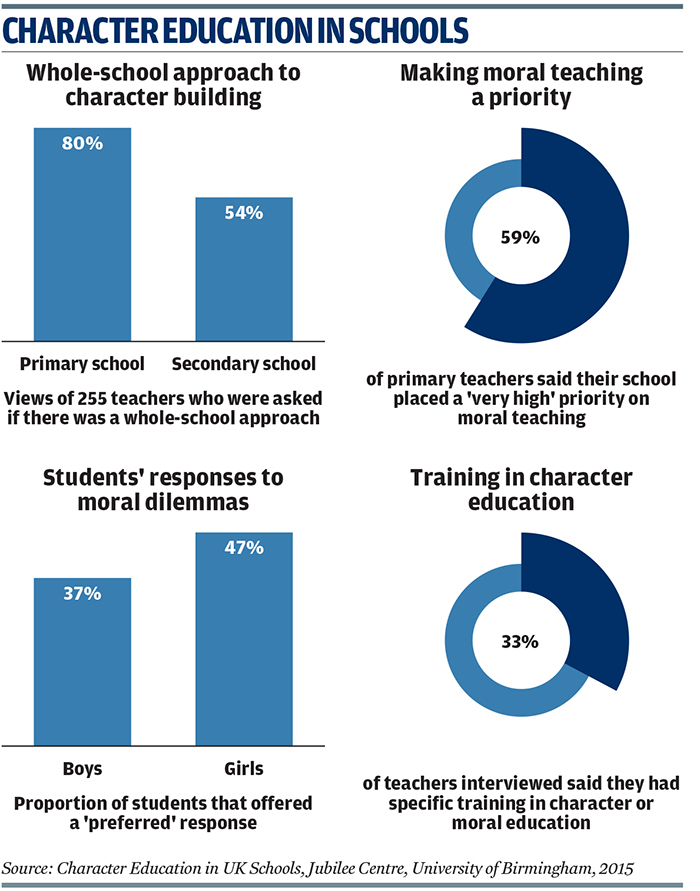Character Education in UK Schools
Professor Sonia Blandford
Tuesday, October 29, 2019
The following executive summary provides a critical appraisal of why we need to reflect on the educational and wider context and associated moral behaviours when developing our understanding of character education.
- Jubilee Centre
- University of Birmingham (2015)
Study summary
There is a growing consensus in Britain that virtues such as honesty, self-control, fairness, gratitude and respect, which contribute to good moral character, are part of the solution to many of the challenges facing society.
Research suggests that children and adults live and learn better with good moral character and that moral integrity can also have a positive impact on performance in schools and workplaces.
Schools across the world increasingly understand the need to help their pupils to cultivate virtues at a young age. Attainment and grades form only a part of this bigger perspective on education. However, until recently, the materials required to deliver this ambition have been largely missing in the UK.

Schools play a critical role in the formation of young people, shaping the character of their students. However, not much is known about the current state of play in character education within Britain. The research project described in this report represents one of the most extensive studies of character education ever undertaken, including more than 10,000 students and 255 teachers in schools across England, Scotland, Northern Ireland and Wales. Research techniques consisted of a mixture of surveys, moral dilemmas and semi-structured interviews. This report explored: the current situation in character education, both in the UK and internationally; how developed British students are with respect to moral character; and the extent to which they are able to understand and apply moral virtues, and how teachers in the UK understand their role in terms of students' moral and character development.
Findings
- The Jubilee Centre's research found that with the right approach, it is possible for many kinds of school to nurture good character: the centre's researchers explored the characteristics of the UK schools, whose pupils were, on average, best and least able to respond to a series of moral dilemmas. Different types of schools appeared in both.
- Groups, including state and independent, faith and non-faith, large and small, those with high and low percentages of free school meals, and those with varying Ofsted ratings. The schools in both groups were spread across the UK, showing no real trends in terms of geography or size of school. Findings also show that a concern for the development of a child's whole character is central to good education and practice.
- In interviews, 54 per cent of British secondary school teachers and 80 per cent of primary school teachers, said that their school already had a "whole school approach to character building". In addition, 59 per cent of primary school teachers believed that their school placed a "very high" priority on moral teaching.
- The Jubilee Centre asked students to respond to a series of moral dilemmas and select the best and worst justifications for their chosen action from a list. Many students taking the moral dilemma tests appeared to approach the dilemmas from the perspective of self-interest.
- On average, participating students had a 43 per cent match with the preferred responses to the moral dilemmas, as selected by an expert panel. Students struggled to identify why they would take a certain action (justification) more than deciding what that action would be (40.5 per cent match with an expert panel). It is also of note that girls outperformed boys (47 and 37 per cent respectively) when faced with these dilemmas.
- The Jubilee Centre's findings also contradict some widely held beliefs about the types of activity that build character. Contrary to the widely held public belief that sport builds character, British students claiming to participate in sporting activities did not perform better than those who said they did not when asked to respond to moral dilemmas. However, students who said they were involved in music or choir or drama outside of school performed better than those who said they were not and did not.
- Overall, this research suggests that there may be gaps in the current system in terms of attempts to develop a child's whole character, not just their academia: 80 per cent of teachers interviewed by the Jubilee Centre stated that the British assessment system "hinders the development of the whole child". In other words, the current system can hold back the development of a child's moral character. Only 33 per cent of teachers stated that they had specific or additional training in moral or character education, yet 60 per cent stated that they had to teach a subject relating explicitly to the development of the whole child (i.e., citizenship). Finally, when asked what single change they would make to achieve better character education for their students, many teachers recommended that schools provide more "free space" where students could be themselves and do things they really like, without having to think about exam scores.
Implications for practice
Consider the following for your staff:
- Are all staff aware of character education in the context of whole child development?
- What are the character and values training needs for all staff in your setting?
By Professor Sonia Blandford, chief executive of Achievement for All and visiting professor of education at UCL Institute of Education.
Achievement for All delivers programmes to improve outcomes for children and young people vulnerable to underachievement in early-years, school and post-16 settings across England and Wales.




